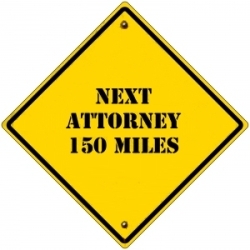 There seems to be a consensus today that the United States has too many law schools and too many law students.
There seems to be a consensus today that the United States has too many law schools and too many law students.
The table below looks at how we reached the current situation. It compares the increase in the number of law students and ABA accredited law schools to the general growth of the U.S. population on a decade by decade basis for the past 60 years.
| Decade |
GeneralPopulation Increase |
Increase in Law School Combined Annual Enrollment |
Increase in Number of ABA Accredited Law Schools |
| 1950-60 |
18.5% |
-16.9% |
12.3% (114 to 130) |
| 1960-70 |
13.3% |
80.1% |
10.8% (130 to 144) |
| 1970-80 |
11.5% |
85.5% |
17.4% (144 to 169) |
| 1980-90 |
9.8% |
4.1% |
3.6% (169 to 175) |
| 1990-00 |
13.2% |
0.6% |
4.0% (175 to 182) |
| 2000-10 |
9.7% |
17.8% |
5.4% (182 to 200) |
As the table indicates, there has never been a correlation between general population growth and increases in law schools and law students.
Although the decline in the number of law students in the 1950’s may be somewhat exaggerated by the fact that law school enrollment boomed in the late 1940’s because of the disruptive effects of the Second World War and the benefits provided by the GI Bill, the period was a remarkably stable era for legal education. Although the number of ABA-accredited law schools increased by 16 in the decade, there was no growth in the number of law students. Law schools remained essentially the same size across the decade or else reduced their enrollments.
In contrast, the decade of the 1960’s and 1970’s saw an enormous increase in the number of law students: a 234% increase over the 20 year period. (This figure compares the enrollment in the 1959-60 academic year with the enrollment in 1979-80.) This enormous growth occurred even though the number of law schools increased only by 30%, from 130 to 169. Obviously, lots of law schools got much larger in these two decades. Presumably, this increase was justified by an increase in the demand for legal services.
In contrast, the period between 1980 and 2000, was a period of remarkable stability for legal education. Total law school enrollment increased by less than 5% over the twenty year period, while the number of law schools increased by less than 8%.
Obviously, the stability of the final two decades of the 20th century ended in the first decade of the 21st. The current economic climate suggests that the nearly 18% increase in the number of law students was not economically warranted.
Why did this happen? What caused the controls exercised in the 1980’s and 1990’s to break down?
Knowledgeable observers are likely to cite the 1995 consent decree between the American Bar Association and the Clinton Justice Department in which the ABA agreed to relax the accreditation standards for new law schools. Moreover, in 2006, the Justice Department levied a fine on the ABA for violating the decree. Regardless of the degree to which the ABA lived up to its part of the agreement, it was clearly easier to establish a new ABA-accredited law school after 1995 than it was before.
However, the number of new ABA-accredited law schools in the first decade of the 21st century is not that out of line with the historical pattern. Between 1950 and 2000, the ABA accredited, on average, 13 or 14 new law schools per decade; between 2000 and 2010, the number was only 18.
While new law schools are responsible for part of the increase in the number of law students between 2000 and 2010, they do not explain the entire increase. Existing law schools also increased their size during the decade.
What the pattern will be in the 2010’s is not at all clear.
 As Ben Stone, one of my favorite TV lawyers, once said, “All clichés are true.” One is particularly true in law school — don’t miss the forest for the trees. Our classes and the studying that accompanies them are certainly the most important thing we have going. This is a school, and we are here to learn to be lawyers. However, classes are not the only way we learn that. If you let your classes become your trees, you will miss the forest that is Marquette Law School, which, if you let it (and you should), will teach you more than just the law. I was prepared to torture the law-school-as-forest comparison into a severely strained metaphor involving trees, plants, trails, streams, and woodland animals, but I’ll spare you. Instead, I’d like to offer some advice on making the most of your law school experience.
As Ben Stone, one of my favorite TV lawyers, once said, “All clichés are true.” One is particularly true in law school — don’t miss the forest for the trees. Our classes and the studying that accompanies them are certainly the most important thing we have going. This is a school, and we are here to learn to be lawyers. However, classes are not the only way we learn that. If you let your classes become your trees, you will miss the forest that is Marquette Law School, which, if you let it (and you should), will teach you more than just the law. I was prepared to torture the law-school-as-forest comparison into a severely strained metaphor involving trees, plants, trails, streams, and woodland animals, but I’ll spare you. Instead, I’d like to offer some advice on making the most of your law school experience.

